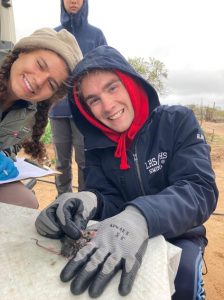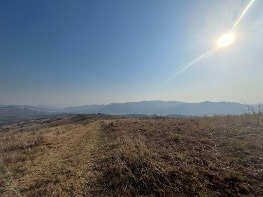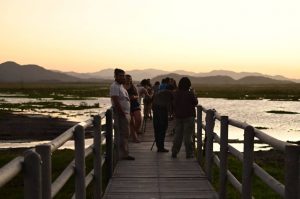After graduating Occidental College this May, I had the utmost pleasure of spending the summer in South Africa with the Organization for Tropical Studies studying Health and Ecology. I had been looking forward to this abroad program for a long time and it truly was the most rewarding cherry on top of my college experience!
I flew into Johannesburg where we received lectures from Professor Samaya Mall preparing us to time travel back into the rich history of South Africa from the archeological relics at the Cradle of Humankind to the civil rights tragedies at the Apartheid Museum. The Institute of Occupational Health brought us back to the present by explaining how crucial the mining industry has been to the developing country and the results of asbestos, lung disease, hypertension, and hand-arm vibration syndrome.
 Next, community healthcare workers in the Tintswalo Hospital educated both us and the community on malaria and HIV signs and symptoms to encourage everyone to feel comfortable visiting the clinic. We learned the One Health model as all of South African health factors are inextricable from their surrounding environment. Thus, we examined the ecological human-animal nexus at Moholoholo Animal Rehabilitation Center, Pretoria Veterinary Clinic, residential-conservation land boundaries, and cattle-dipping sites. Leisel, a researcher at Hans Hoheisen Wildlife Research Station, led us in fieldwork collecting mice data on a farm to study zoonoses, which I surprisingly really enjoyed. Thanks to the enthusiasm of OTS staff we made amazing memories through practical learning experiences.
Next, community healthcare workers in the Tintswalo Hospital educated both us and the community on malaria and HIV signs and symptoms to encourage everyone to feel comfortable visiting the clinic. We learned the One Health model as all of South African health factors are inextricable from their surrounding environment. Thus, we examined the ecological human-animal nexus at Moholoholo Animal Rehabilitation Center, Pretoria Veterinary Clinic, residential-conservation land boundaries, and cattle-dipping sites. Leisel, a researcher at Hans Hoheisen Wildlife Research Station, led us in fieldwork collecting mice data on a farm to study zoonoses, which I surprisingly really enjoyed. Thanks to the enthusiasm of OTS staff we made amazing memories through practical learning experiences.
Staying in the Venda villages in HaMakuya was my most memorable experience: we learned the language (TshiVenda), danced with kids, played games in the yard, collected firewood, swept coals, spread mud along the walkway, and shared our family trees around the fire. I made friendship bracelets emblematic of our global connection to give all the friends we made there along with books, pencils, and blankets we gifted to our homestay family for graciously making space for us in their home. Our homestay mom is a traditional healer, she taught us how to cook pap among other traditional dishes. On our first night there, we were collecting kindling for the fire; I found a dried seed pod under a tree that I was about to add to the fire before she stopped me, ate a seed, and taught us how that plant has medical properties for cleaning your eyes and improving vision.
The sacred science of herbal and traditional medicine stood out to me at the remarkable intersection of history, culture, health, and ecology. At the Skukuza Science Leadership Initiative campus in Kruger National Park, when we were not on game drives spotting the big five (elephant, buffalo, lion, leopard, & rhino), my group formulated a research proposal under the guidance of Laurence Kruger and Patrick O’Farrell for a traditional healer survey and community garden plan. Our goal is to honor and protect sustainable harvesting practices, herbal medicine within modern healthcare, and the intellectual property rights of African indigenous plant healers as bioengineering makes its way into the economy to ethically optimize the profit of and access to VhaVenda ethnobotanical remedies.
OTS helped me grow to understand that, no matter what environment I enter, I can leave a positive impact. Being in South Africa for their program confronted me with novel situations that were a true joy to tackle alongside new-found, forever friendships. Every day in Africa the world opened up in an interesting way and I created connections that will last a lifetime.
Sincerest thanks and gratitude to the generous supporters of the Organization for Tropical Studies for giving me the wings to fly out into this great, wide world — I could not have done it without you.


